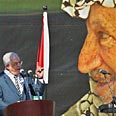
Abbas turning into Arafat
Why is Israel happy to see Palestinian leader increasingly resembling tyrant he replaced?
It appears that the establishment of the Palestinian emergency government headed by Dr Salam Fayyad proved, in Prime Minister Olmert's eyes, his optimistic approach in the face of the bloody chaos in the Gaza Strip: There, the horror show we've been watching with loud disapproval gave rise to the kind of government we've been seeking for ages.
A tie-wearing government without beards for the sake of which we are willing to hand over some withheld tax funds that Palestinians deserve by law and even engage in talk of prisoner release, roadblock removal, and promises for further "gestures" that Israeli politicians tend to make whenever they're in good spirits.
However, all those celebrating this euphoria should be reminded that this dream government is supposed to run its course in about two weeks. According to the Palestinian constitution, an emergency government can only serve for a 30-day period and after that it needs the support of two-thirds of Legislative Council members. Considering the fact that the Palestinian parliament is comprised of Hamas members, this probably won't happen.
What then will happen to the Palestinian political system within a short while? Will the emergency government indeed be disbanded and power returned to Hamas?
To judge by Mahmoud Abbas' conduct in recent months, the answer is negative. It is more likely that the beaten president would continue to juggle his extensive authorities in order to extend the Fayyad government's term and perhaps even expand it. Ever since the Islamic movement won the elections about a year-and-a-half ago, Abbas adopted a series of far-reaching measures in order to take control of as many powers as possible (such as control of security apparatuses, which by law should be at the hands of the interior minister.) Abbas did this in a desperate bid to prevent Hamas' complete takeover of all Palestinian authority government arms.
Rare opportunity?
These measures are indeed welcome and even essential from an Israeli and international viewpoint, but to a certain extent they embody the genuine Palestinian tragedy: The gulf setting apart Mahmoud Abbas, the prime minister who only a few years ago fought valiantly in order to decentralize the exaggerated powers possessed by President Arafat, from Mahmoud Abbas the president, who is fighting in order to take control of those very same powers. This is the abyss that separates the Palestinian dream of a proper, independent and democratic government system and this dream's colossal failure.
The very same Abbas, the serial quitter who dared challenge Yasser Arafat's tyranny, is slowly changing his spots and adopting the same aggressive tactics that he deeply rejected only a short while ago, with the assistance of a series of presidential decrees whose legality faces a large question mark. In essence, this is an even deeper transformation than the one experienced by Ariel Sharon during the evacuation of settlements in the Gaza Strip.
Why then does Israel celebrate the turning of a person with genuine democratic aspirations into a duplicate of Arafat, the person it so much loved to hate? Are we indeed talking about an Israeli desire to see a "partner" who exercises control and who is a person we can talk to? After all, at the start of his presidential term Abbas enjoyed incredibly high approval ratings, and still, this didn't prevent Israel from undertaking the unilateral move in the Strip about six months after he was elected. So why are we in fact so happy now?
The genuine and painfully banal question is not "why Israel is overjoyed," but rather, why not? After all, Israel has always shown contempt to the abstract term "Palestinian democracy," as can be attested to by the dozens of Palestinian parliament members and ministers who have been sitting in Israeli prisons for a year now.
Hence, through domestic trampling of the law along with external handcuffs, we see the emergence of an Iraq-style "democracy" in the territories based on the American model, with the same results we already see on the ground. Yet only we, the eternal optimists we are, view this as a "rare opportunity."










